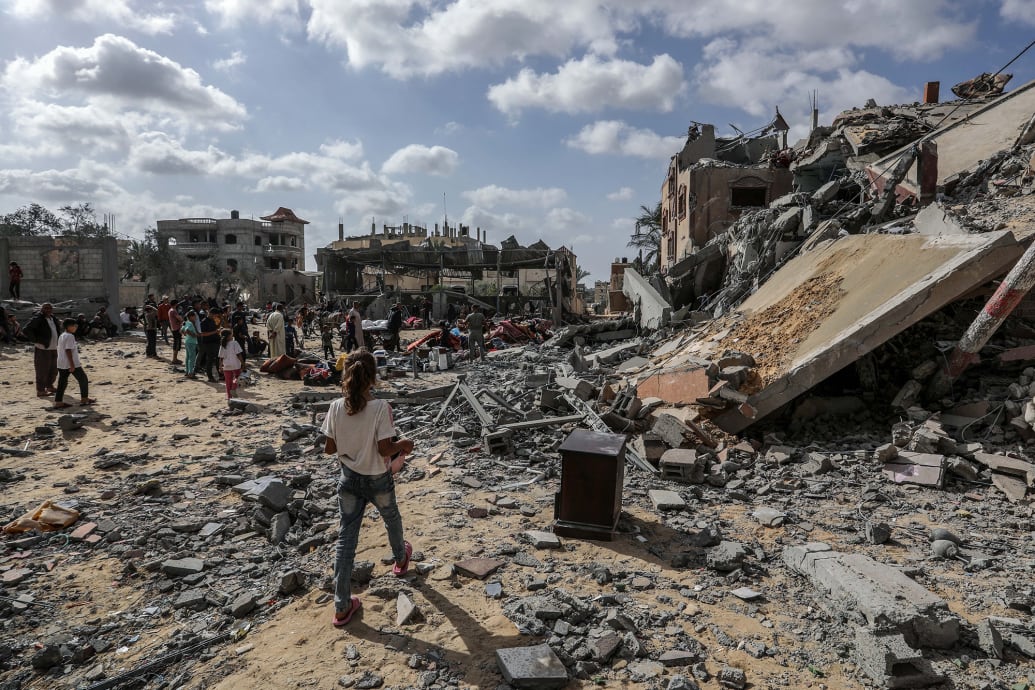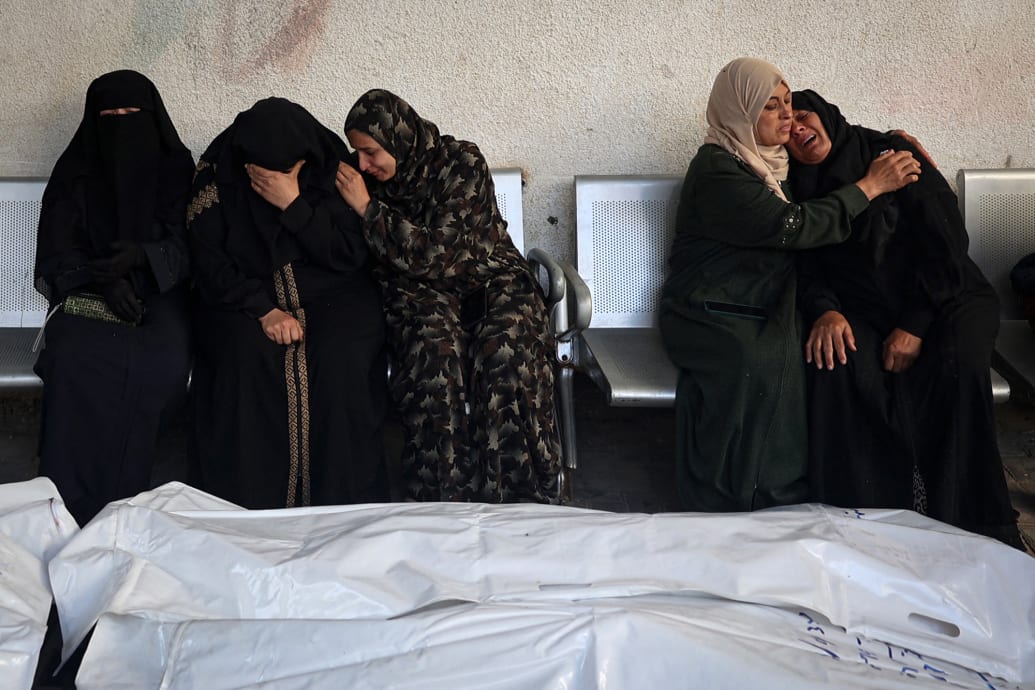In the midst of the chaos that engulfed Gaza last October, I, like many others, initially believed that the conflict would only target specific Hamas-affiliated hideouts and neighborhoods. The reality soon dawned upon us all, however, this was a war against every facet of life in Gaza.
I’m a lawyer, but I soon found myself displaced and stripped of everything familiar: my home, my job, even the necessities of life like food, clothes, medicine, and water. In this war, we Gazans—whether rich or poor, powerful or powerless—all stood together, equally vulnerable against the brutal Israeli attacks.
In the initial onslaught, my family and I sought refuge in the Christian Orthodox cultural center in Gaza City. But after enduring days of relentless bombardment—with strikes perilously close to our refuge—we fled to the south of the Strip just two days before the center was obliterated.
Isolated from the world, with no means of communication except for a journalists’ tent at the Shuhadaa Al-Aqsa hospital, we felt the full weight of despair. Even that sanctuary was not spared, as the hospital fell victim to Israeli strikes.
Feeling lucky to have survived numerous close calls yet burdened with guilt for those who remained in Gaza battling death on a daily basis, I was able to escape across the border but my family is now divided. Our brother Maher, 31, remains trapped in Rafah, where we were all told to seek shelter by the Israelis, who are now preparing to storm the city in a terrifying blitz of bombs, tanks and automatic weapons.

Palestinians inspect damaged houses after Israeli warplanes bombed homes in Rafah, southern Gaza.
Abed Rahim Khatib/picture alliance via Getty Images
President Joe Biden has been urging Israel not to raid the final refuge but unconfirmed reports recently suggested that U.S. opposition was lifted as a bargaining chip to stop Prime Minister Benjamin Netanyahu launching a full military assault on Iran.
“The population of Rafah remains in disbelief following the news that the American approval of Israeli operations in Rafah in exchange for a canceled response to Iran’s attack on Israel,” said Maher. “People are in shock; all the talk in the market and streets centered around where to seek refuge if the operation in Rafah commences.”
A feeling of horror pervades the city where more than a million people forced from their own homes have multiplied the population of the city ten-fold. They did what they were told by the Israelis, now they are captive and waiting for more torment to befall them.
“There’s a massive human gathering in Rafah now,” says Ahmed Qishta, 40, a farmer and father of five. “Did they come here to perish by the hundreds?”

Relatives of Palestinians killed in Israeli bombing mourn near their corpses in the yard of the Al-Najjar Hospital in Rafah in southern Gaza on May 3, 2024.
AFP via Getty Images
There is a feeling of utter helplessness. “The Israeli media claims that the army will evacuate us. But how can they do so when there’s no space to set up additional tents elsewhere? Khan Younis is in ruins, the central area is overcrowded, and returning to Gaza City is forbidden. Will they compel us to leap over the wall into Egypt, or will they resort to lethal force against those attempting to flee?”
The only way out of Gaza for most people is to pay an Egyptian company to co-ordinate their passage at the Rafah crossing. It is unclear exactly how this company persuade Egyptian officials to add the names of their customers to travel lists, but the price you must pay has shot up as the crisis continues to worsen.
“Maybe they’ll shut down the sole crossing available for travel, the Rafah crossing. If I were to apply for travel permission, I’d have to endure a wait of about 20 days for Egyptian approval. Will this timeframe be enough to escape before the invasion? Or is it too risky to gamble with the $5,000 dollars required for this permission?” says Qishta.
That fee has already gone up for male travelers, who are being asked to pay $12,000.
Our family made the agonizing decision to leave, a decision that has become inevitable for all my friends in Gaza now. But leaving isn’t simple; it required funds we didn’t have, but the specter of impending death and destruction loomed large.
With the help of a GoFundMe campaign, we hoped to gather donations to cover the costs of paying an Egyptian coordination company but eventually my two sisters, one brother and I were accepted for coordination through the Israeli army. My mother and sister followed after selling all their jewelry but we have another brother left behind.
Now, we are desperate to raise the funds to get him out but the price has skyrocketed out of our reach and reports every day suggest the invasion is coming. A friend, Sabine Devins, has helped organize the fundraiser on GoFundMe for us.
Our friend, Ghadeer Abu Hassira, 30, a mother of twins born during Ramadan this year in Rafah, is stuck in the same position with her young family.

Ghadeer Abu Hassira’s twins.
Courtesy of Ghadeer Abu Hassira
She hasn’t even been able to set up a GoFundMe because she has access to no bank account outside of Gaza. “I don’t have family outside, so I can’t find a reliable bank account to collect donations via GoFundMe, leaving me unable to use this approach to collect the amount needed for the coordination to leave.”
Ghadeer recounts the devastation wrought upon her household and that of around 100 family members. She recalls, “Fleeing Gaza City in November while pregnant, I endured childbirth without essential resources, losing everything I owned—my house, my car, my jewelry, even my clothes. Then I was rescued from the debris in the central area, my husband and I sought refuge in Rafah, where I gave birth in dire conditions.”
“I survived many times with my husband and twins but now no way to go out of Rafah, and no clarity were we will evacuate if they started the operation,” she told The Daily Beast.
Mustafa Ibrahim is Palestinian human rights researcher, who is now himself displaced in Rafah and awaiting the chance to escape to Egypt. He explained that it took four months for Israel to destroy Khan Younis in continuous bombing and ground attacks but now that Israel has withdrawn, Hamas can just return to the remains of cities like Khan Younis. And yet, he says, they are about to launch another pointless assault on Rafah.
“People here are dying slowly; they don’t know if they’ll return to their homes soon or not. There are tens of thousands of sick and injured people who cannot travel for treatment. If the war begins in Rafah, this means that more of the wounded will not be able to travel,” he said. “What awaits Rafah is a catastrophe because there will be no way for the already scarce aid to enter.”
“Will the war end after the Rafah operation?” he asked. “Israel wants to make Rafah an uninhabitable place. Netanyahu claims that absolute victory will be achieved with the invasion of Rafah but it will be nothing but revenge.”
Part of my family, like so many others, is waiting, powerlessly, for that vengeance to be unleashed.
Hanady Sala is a lawyer who specializes in advocating for human rights, particularly women’s rights.
